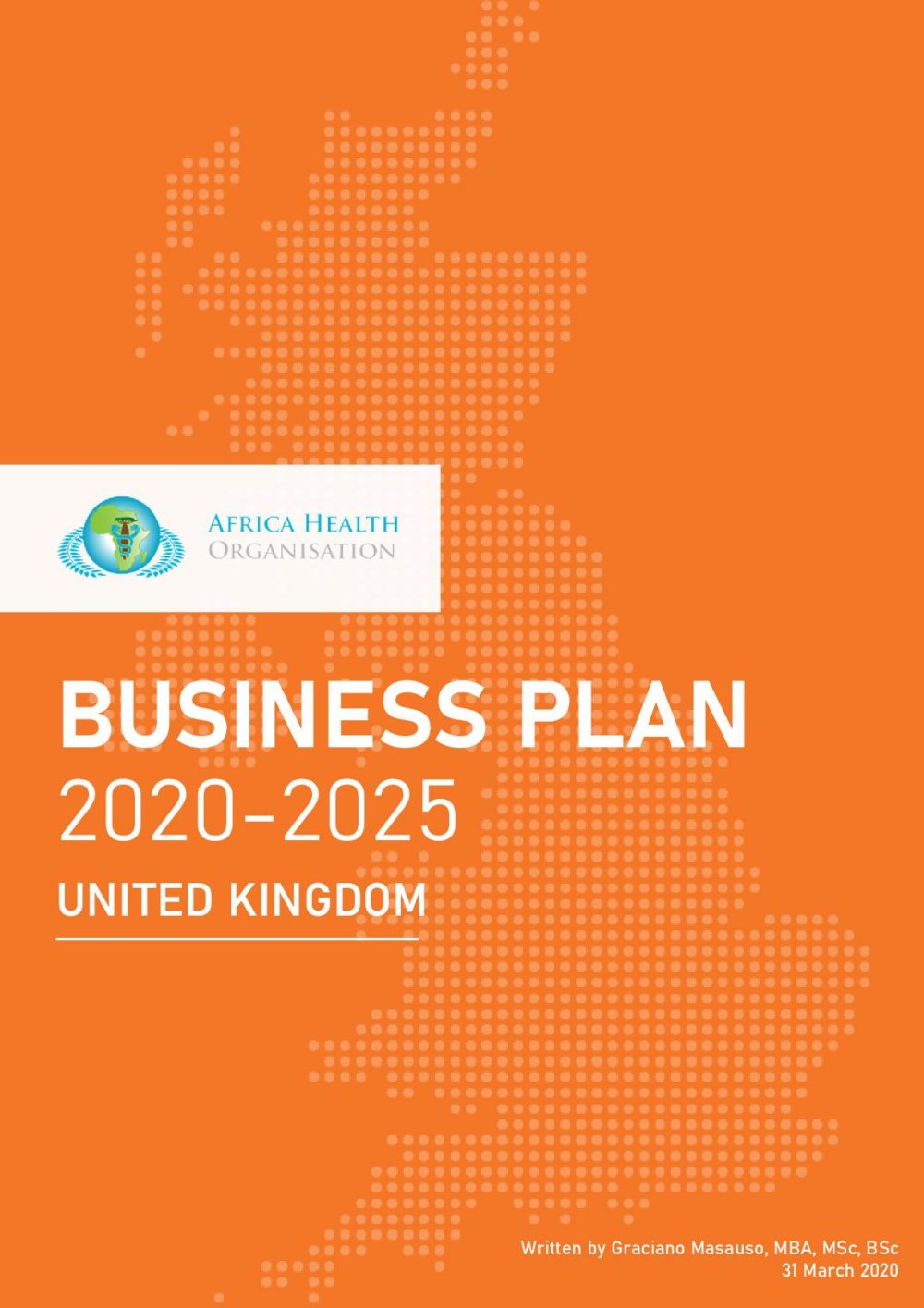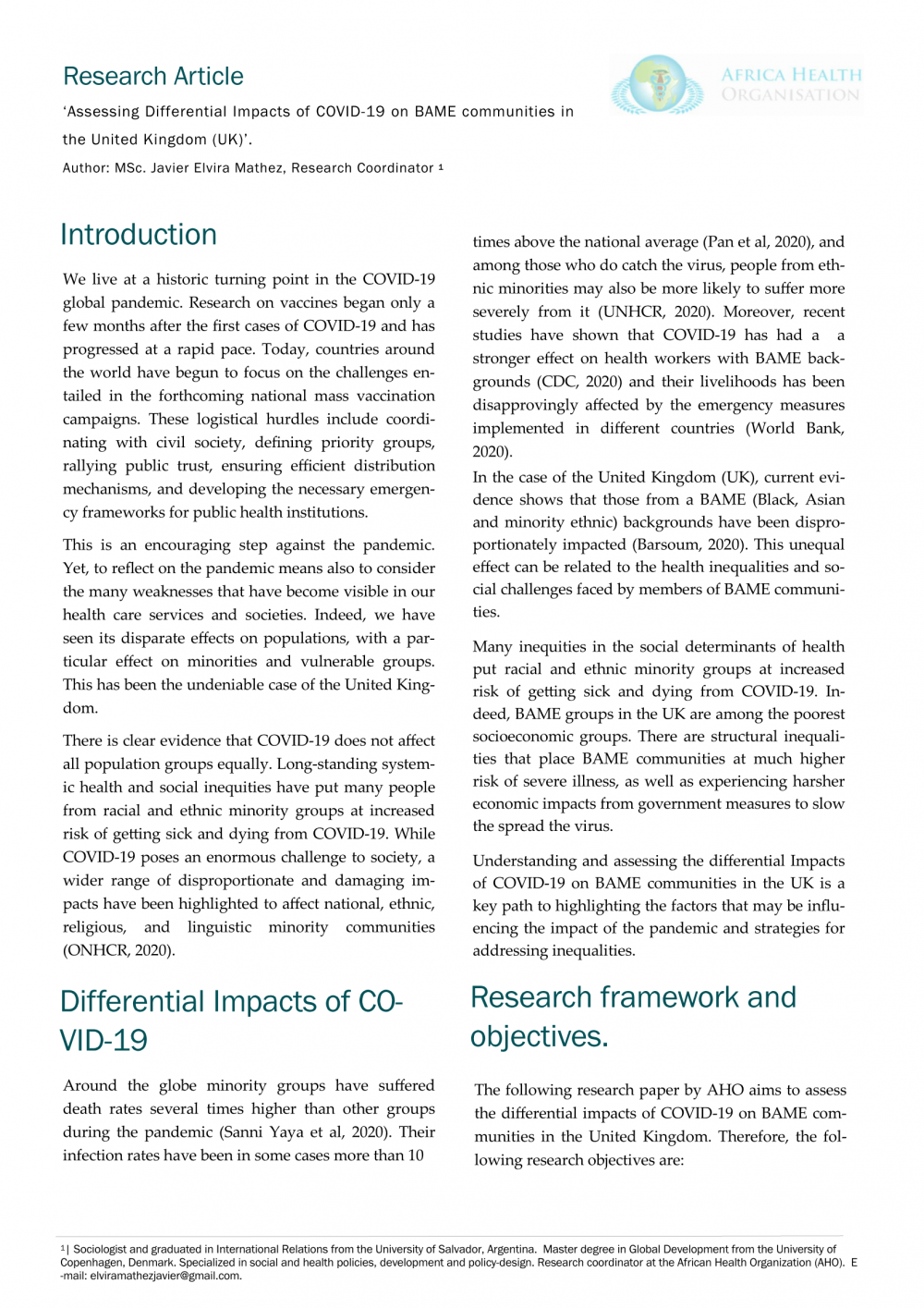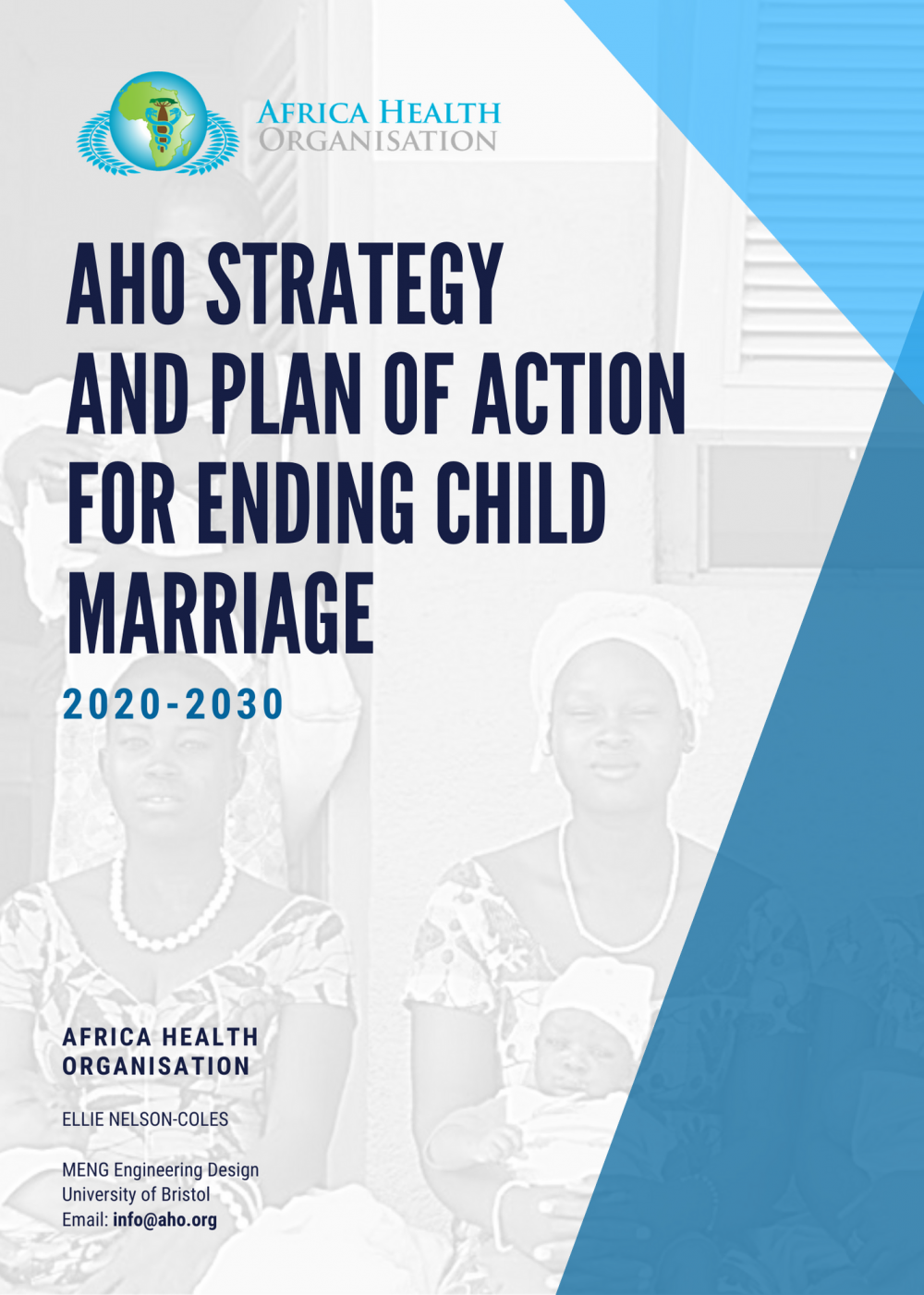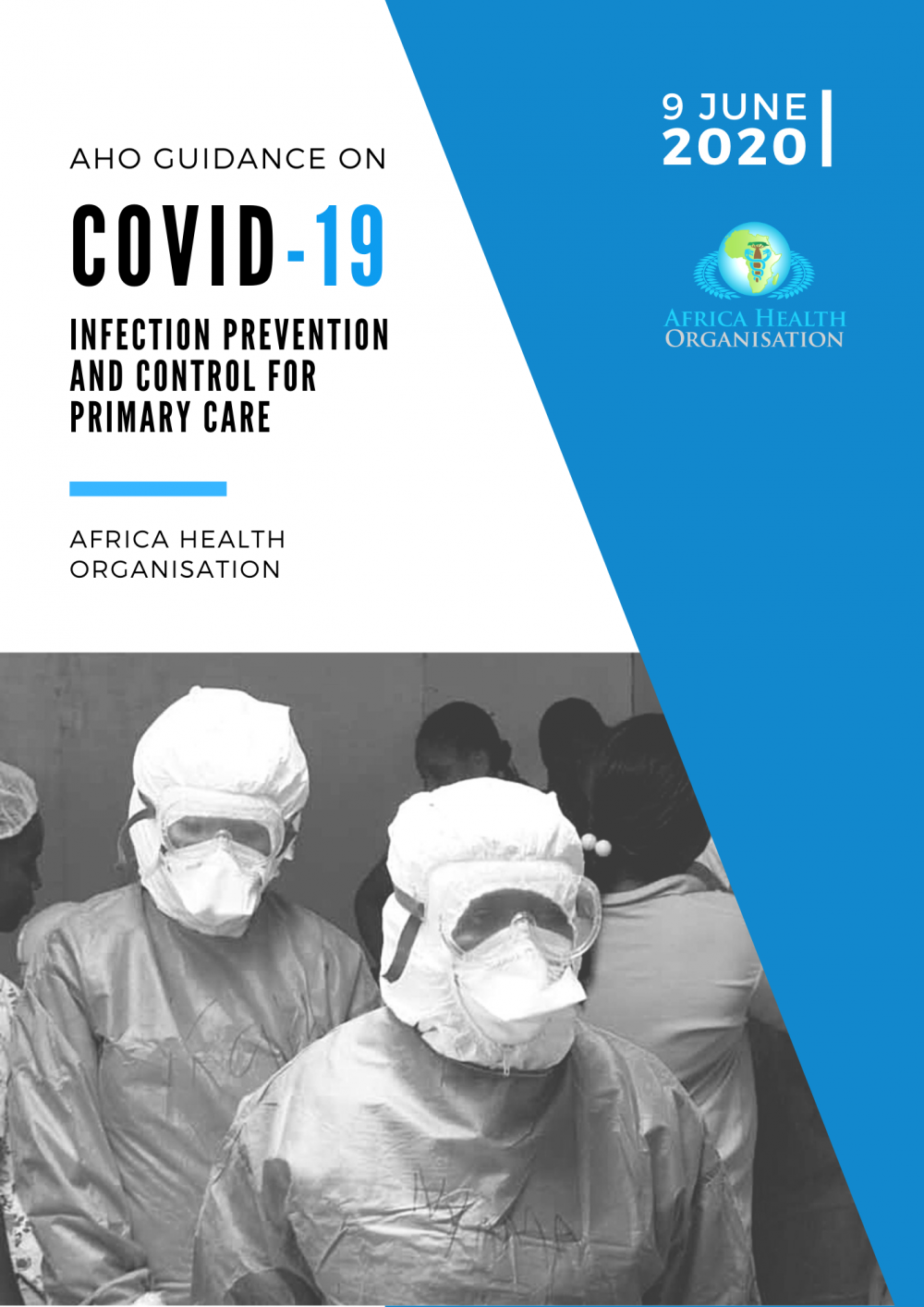Publications Download AHO Plans & Strategies
AHO Business Plan 2020-2025 for the United Kingdom
African people in the UK like other Black, Asian and Minority Ethnic (BAME) communities face many challenges and health inequalities as a result of poverty, discrimination failure in addressing the determinants of health and improving the health of these populations. Together with these social ills, Africans have seen negative trends in health indicators, including rise in infant and maternal mortality, an increase in HIV morbidity and mortality, increase rates of tuberculosis and low rates of immunisation uptake.
Download
Assessing Differential Impacts of COVID-19 on BAME communities in the United Kingdom
There is clear evidence that COVID-19 does not affect all population groups equally. Long-standing systemic health and social inequities have put many people from racial and ethnic minority groups at increased risk of getting sick and dying from COVID-19. Understanding and assessing the differential Impacts of COVID-19 on BAME communities in the UK is a key path to highlighting the factors that may be influencing the impact of the pandemic and strategies for addressing inequalities.
Download
AHO Strategy and Plan of Action for Ending Child Marriage
This report presented the Africa Health Organisation’s strategy between 2020 and 2030 to work towards the elimination of child marriage in Africa. Over one third of girls in Africa are married before the age of 18, impacting their health, earning prospects and independence. Therefore, it is vital that the rate of reduction of child marriage is dramatically accelerated to prevent the violation of the rights of millions more girls.
Download
AHO Guidance and Technical Report on COVID-19 infections prevention and control for primary care settings in Africa
Africa Health Organisation (AHO) has produced a Guidance and Technical Report on COVID-19 infection prevention and control for primary care, including general practitioner practices, dental clinics and pharmacy settings in Africa.
Download
AHO Strategy and Plan of Action on Ending Adolescent Pregnancy
Adolescent pregnancy, defined in this report as the occurrence of pregnancy in girls aged 15-19, is a global problem with severe health, social and economic impacts. Adolescent mothers are more at risk of pregnancy-related health complications, early school drop-out and poverty. In addition, many adolescent pregnancies occur in the context of human rights violations: 90% of births to adolescent girls occur within early marriage.
AHO Strategy and Plan of Action on Ending Female Genital Mutilation
As an international health agency, one of the key areas of concern for Africa Health Organisation (AHO) is “promoting equity in health” across Africa.1 Fundamental to achieving this aim is a thorough understanding of the ways in which gender affects health. Beyond recognising the biologically unique healthcare requirements of women in relation to pregnancy, menstruation and other key issues, we must understand how some of the cultural traditions practiced by African communities jeopardise the standard of health and quality of life experienced by women living within these communities. Female genital mutilation/cutting (FGM/C) – as a widespread practice which violates numerous human rights including “the right to non-discrimination on the grounds of sex” and “the right to freedom from torture or cruel, inhuman or degrading treatment or punishment”2 – poses a particularly significant threat to the health of African women.
AHO Strategy and Plan of Action on Ending Violence Against Women
Violence against women can inflict physical and mental long-term harm to the victims, their families and children as well as the local community. The Africa Health Organisation (AHO) recognises that to achieve their vision of “delivering high quality sustainable health service” and “ensuring that all the peoples of Africa enjoy optimal health”, the gender implication of health must be acknowledged. This report examines the prevalence of physical and/or sexual intimate partner violence and the prevalence of sexual violence by a non-partner in Africa and makes comparisons between other continents. As well as discussing findings and existing policy, new recommendations are made which takes into consideration the relationship between global pandemics and violence against women
AHO Strategy and Plan of Action on Female Genital Mutilation FGM
AHO Strategy and Plan of Action on Girls Education
A number of obstacles limit women and girls from fully exercising their right to participate in, complete, and benefit from education; to name a few, poverty, geographical isolation, minority status, disability, early marriage and pregnancy, gender-based violence, and traditional attitudes about the status and role of women. The nature of the challenge of achieving education equality is multi-faceted and a number of these obstacles are compounding heightening the complexity.
AHO Strategy and Plan of Action on Girls’ Education in Africa
Today, approximately 60 million primary school children are missing from classrooms and half of them live in sub-Saharan Africa (60 million girls, 2019). Moreover, large gender gaps still remain in terms of access to and learning achievement in education in many settings across the world. 16 million girls will never set foot in a classroom and women account for two thirds of the 750 million adults without basic literacy skills.
AHO Strategy and Plan of Action on HIV AIDS and Access to Antiretroviral Therapy for Women
Over the past 30 years, enormous progress has been made in the prevention and treatment of HIV/AIDS. Yet a complex combination of factors including gender inequality mean that women are disproportionately affected by this public health crisis; with HIV/AIDS ranking as the second leading cause of death in African women (WHO, 2018a). The amalgamated effect of both social and biological causes similarly places ‘key populations’ at risk of poor HIV/AIDS outcomes. People from these underserved groups made up a quarter of all new HIV infections in those aged 15 - 49 years in Eastern and Southern Africa in 2018; and almost two thirds in Western and Central Africa (UNAIDS, 2019
AHO Strategy and Plan of Action on the General Impact of COVID-19 on Women and Girls
This report presents the AHO Strategy and Plan of Action on the general impact of COVID-19 on African girls and women. As a result of the COVID-19 pandemic, many girls and women in Africa are experiencing negative impacts on their health, education, finances and a rise in gender-based violence. Therefore, it is essential that policymakers and governments implement measures and offer support across Africa to prevent multifaceted issues from rising and affecting the lives of girls and women in the continent
AHO Strategy and Plan of Action Women’s Health
This document outlines the African Health Organisation’s strategy for women’s health. According to a 2012 report from the World Health Organisation (WHO), women account for over half Africa’s human resources. As such, addressing women’s health needs positively impacts on the socioeconomic development of societies, countries and the continent. Given the multifaceted nature of women’s health, a multidimensional approach that considers all aspects of individual women’s lifestyles, must be adopted.

